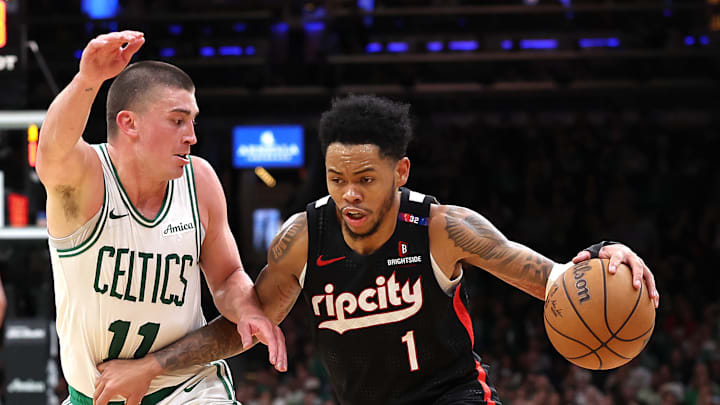In a blockbuster July 7 swap, the Boston Celtics sent defensive ace Jrue Holiday to the Portland Trail Blazers in exchange for high-scoring guard Anfernee Simons. The move saved Boston $40 million in luxury taxes and signaled a new era of financial strategy under new owner Bill Chisholm, whose approach prioritizes flexibility and long-term sustainability.
While acquiring Simons brought a much-needed scoring punch, league insiders suggest the Celtics may view him more as a valuable trade asset than a permanent fixture. NBA insider Jake Fischer reported on Sunday that Boston "will continue to invite trade discussion involving Anfernee Simons from now through next season's trade deadline." With the deadline looming in February, Boston appears poised to explore deals that trim salary further while bolstering roster depth or acquiring future assets.
Anfernee Simons Will Reportedly Remain on the Trade Block Until Deadline
Simons, 26, is a three-level scorer with legitimate shooting range. Over seven NBA seasons, he’s averaged 15 points per game on a career 38.1% mark from three-point range. Last season with Portland, Simons started 70 games and averaged 19.3 points, 4.8 assists, and 2.7 rebounds. His ability to create his own shot and space the floor makes him an attractive addition for teams seeking backcourt firepower.
Still, Simons isn’t without limitations. His defense has been inconsistent, and he’s more suited to a lead scoring role than a two-way guard who locks down opponents. For a Boston team built around elite defensive versatility and depth at the guard spots, that raises the question: is Simons a long-term fit or simply a trade chip?
The Celtics' backcourt already features Derrick White and Payton Pritchard, who will be asked to initiate the offense more this season in the absence of Jayson Tatum. Keeping Simons on the team gives the team another dangerous scoring option, but given that he doesn’t provide much on the defensive end, it shouldn’t come as a surprise that the Celtics are willing to part ways with him.
Ultimately, the Celtics’ acquisition of Simons underscores a broader organizational shift under Bill Chisholm: maximizing financial flexibility while building a competitive, adaptable roster. Whether Simons remains in Boston long-term or becomes a key piece in a future trade remains to be seen — but one thing is clear: the Celtics are strategically positioning themselves for sustained success in a salary-cap era that rewards smart asset management.
